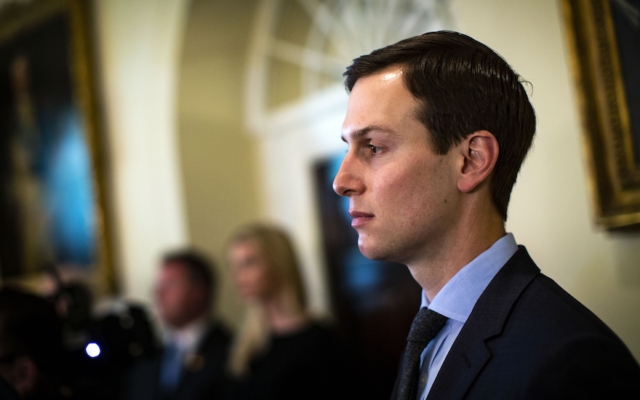Kushner launches ‘opportunity of century’
AFTER years of anticipation, Donald Trump's "ultimate deal" proposal for mideast peace is public – and Palestinian leaders say it will spike tensions instead of achieving its aim.

AFTER years of anticipation, Donald Trump’s “ultimate deal” proposal for mideast peace is public – and Palestinian leaders say it will spike tensions instead of achieving its aim.
Jared Kushner, adviser to Donald Trump, launched the plan at a summit in Bahrain on Tuesday, saying it will give the Palestinians a “brighter and more prosperous future”.
Kushner said that the conversation until now has been dominated by the “same broken record of negativity” and politicians paying “lip service” to the Palestinian cause while little progress is made.
His optimism came against a backdrop of Palestinian anger and criticism of the peace plan and the summit – some of which is being echoed by Jewish critics.
Fatah, the strongest Palestinian political party, is calling the proposal “Zionist-American terrorism,” and the senior Palestinian Authority (PA) politician Hanan Ashrawi said that the plan is “all abstract promises”.
The PA’s Foreign Ministry claimed that it tries to “whitewash the occupation and settlements.”
Michael Koplow of the Israel Policy Forum, a dovish Washington-based think tank, called it “the Monty Python sketch of Israeli–Palestinian peace initiatives”. He said he had low expectations but “hadn’t ratcheted them down nearly far enough”.
As The AJN went to press, the Bahrain summit, convened to discuss the plan, was still underway. Various prominent figures from the Arab world were attending, including Bahrain’s Prince Salman bin Hamad bin Isa Al Khalifa and delegations from Jordan, Saudi Arabia, Morocco, Egypt and elsewhere.
There were a few Palestinians who went in a personal capacity, but no delegation from the Palestinian Authority or the PLO.
As the workshop started, protests were taking place on the Gaza border and in various Palestinian cities and towns, including Jenin and Hebron.
Demonstrators decried the Bahrain event as “treason”, and according to Hamas, some protesters on the Gaza border clashed with Israeli forces and sustained injuries. A general strike was underway in Gaza and Palestinian parts of the West Bank.
The Peace to Prosperity plan just released by the the White House focuses on improving the economic situation of Palestinians. It does not address the issue of a political deal to end the Israeli–Palestinian conflict, which will be dealt with in a document that is expected after Israel’s September election.
White House officials said that the plan will raise US$50 billion in international money to help Palestinians to “build the society that they have aspired to establish for generations”. They say it could more than double the Palestinian GDP within a decade, create more than a million jobs for Palestinians, and almost eliminate unemployment.
They believe it makes sense to first talk about prosperity that Palestinians have to gain from peace before getting down to the nitty gritty of how an Israeli–Palestinian peace deal will work at a later stage. They call the plan the “most ambitious and comprehensive international effort for the Palestinian people to date.”
Kushner said it will be the “opportunity of the century” if Palestinians have the “courage” to pursue it.
Many politicians in Jerusalem are praising Washington for thinking outside the box. Yuval Steinitz, government minister and associate of Benjamin Netanyahu, said that the plan “looks good”. Benjamin Netanyahu said: “We’ll hear the American proposition, hear it fairly and with openness. I cannot understand how the Palestinians, before they even heard the plan, rejected it outright.”
Yair Lapid, joint leader of the opposition Blue and White party called it “a constructive attempt” to make Palestinians realise that if they keep rejecting peace proposals they “will lose a lot of money and a lot of opportunity”.
Other Israeli politicians say there is nothing original in the plan, and echo Palestinian dismay.
Nitzan Horowitz of the left-wing Meretz party, said that the idea of getting to peace by prioritising economics is a “bluff”. He said that the plan “is just an attempt to escape the real issue: direct talks with the Palestinians”.
The White House presented its plan in a 40-page brochure. One of the main aims outlined is to “unleash the economic potential of the Palestinians” by giving a major boost to the private sector, encouraging investment, and getting Palestinians to trade more with Egypt, Jordan, Israel and Lebanon.
Another aim is to “empower the Palestinian people to realise their ambitions”, by improving healthcare, education, and cultural provision.
The White House has not said how much it will contribute towards the billions of dollars it wants to raise for the plan, and while it is expected to give some money, it expects other countries to give generously.
Critics point out that in 2014 John Kerry, then US Secretary of State, launched a plan to raise US $4 billion for the Palestinians, this failed, and yet the Trump administration want to raise 12.5 times this amount.
NATHAN JEFFAY

comments